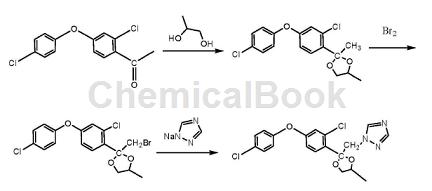Background and overview[1]
Plant diseases are the enemy of agricultural production. According to statistics from the Food Organization of the United Nations, 10-15% of crops are lost due to diseases every year. At present, the main means of preventing and controlling plant diseases is the use of chemical fungicides. Agricultural fungicides developed and used in recent years mainly include triazoles, methoxyacrylates, amino acid derivatives, amides and other fungicides. These agricultural fungicides not only have high activity, unique mechanisms of action, and are environmentally friendly, but also have special effects on difficult-to-control diseases such as rice blast, downy mildew, gray mold, and damping off.
Difenoconazole occupies a very important position among triazole fungicides and has become one of the most widely used fungicides in crop cultivation. This agent is mainly used for fruit trees, vegetables, wheat, potatoes, beans, melons and other crops to prevent and treat a variety of fungal diseases and has good protective and therapeutic effects without contaminating the environment and agricultural products. Since the launch of difenoconazole in 2018, sales have continued to rise, with an average growth rate exceeding the above. It is the largest sales variety among triazole fungicides, except tebuconazole and epoxiconazole.
Apply[1-3]
The main consideration for difenoconazole emulsifiable concentrate is the solvent used. Domestically, xylene is used as a solvent due to cost and customary considerations. Since xylene is a low flash point, volatile solvent, the processed emulsifiable concentrate is currently considered a non-safe and environmentally friendly dosage form, and its domestic registration and research and development have been restricted. Examples of its application are as follows:
1) Preparing an agricultural insecticidal composition, especially an insecticidal and fungicidal composition containing lufenuron and difenoconazole, and including organic silicon as a synergist. Lufenuron and difenoconazole emulsifiable concentrate, the emulsifiable concentrate consists of lufenuron 5%, difenoconazole 10%, silicone 3%, fatty alcohol polyoxyethylene ether 8%, agricultural milk 500# 6%, solvent oil Make up 100% of the balance, put the above raw materials into the mixing kettle and mix according to the conventional method of preparing emulsifiable concentrate, to make 5% lufenuron and 10% difenoconazole emulsifiable concentrate; the organic silicon refers to the silicone containing trisiloxane Or silicone surfactant with modified trisiloxane structure. The insecticidal and fungicidal composition composed of lufenuron and difenoconazole is a new pesticide with low toxicity, high efficiency and low residue. When used in combination, it can improve the virulence of crops and kill both pests and diseases. effect. It can not only expand the scope of prevention and control, but also reduce the number of pesticide applications and improve labor efficiency.
2) Used for the prevention of white spots on papaya peel, including the following steps: garden sanitation treatment, complete elimination of weeds, dead branches and leaf residues in the papaya planting garden, concentrated retting, fermentation at high temperature and full decomposition, Apply fertilizer into the garden; add 2-4 kilograms of bio-organic fertilizer per plant every month during the peak period of fruit picking; control the humidity in the garden after fertilization and water regularly; spray 1-2 times of pesticides before flowering for prevention, and apply before and after raining Follow up with spraying agent in time to maintain the efficacy. The agent can be 10% difenoconazole emulsifiable concentrate 1000-1500 times liquid, 25% basic copper sulfate suspension 600-700 times liquid or 55% copper hydroxide dispersible granules 900- Any one of the 1200 times solution; before the papaya plants bear fruit, add compound fertilizer and medium and trace elements: magnesium sulfate, ferrous sulfate, zinc sulfate, borax and calcium nitrate every 7-10 days. The method disclosed in the invention is simple and low-cost, can effectively prevent and alleviate white spots on the surface of papaya, and ensure the appearance quality of the fruit.
Preparation[4]
Using chlorophenoxyacetophenone as raw material, difenoconazole is synthesized through cyclization, bromination, and nucleophilic substitution with sodium triazole:

Using 2-chloro-4-chlorophenoxyacetophenone as raw material, first cyclization, then bromination, and finally nucleophilic substitution with sodium 1,2,4-triazole to synthesize difenoconazole, which is The earliest reported process for the synthesis of difenoconazole is still the main method for industrial synthesis of difenoconazole. As discussed above, this method does not disclose the use of key catalysts in the preparation of 3-chloro-4-methyl-2-bromomethyl-1,3-dioxopent-2-ylphenyl-4′-chloro. During the reaction of phenyl ether, about 15% of dibromide is generated, and about 5% of 2-chloro’-4-chlorophenoxyacetophenone cannot be converted. During the preparation of difenoconazole During the reaction process, by-products are generated, and the quality and yield of the final product are low.
Main reference materials
[1] Progress and application of the fungicide difenoconazole
[2] CN201210062992.1 Lufenuron and difenoconazole emulsifiable concentrate
[3] CN201811186322.4 A method for preventing white spots on papaya peel
[4] Research on the recovery and synthesis of new difenoconazole

 微信扫一扫打赏
微信扫一扫打赏

